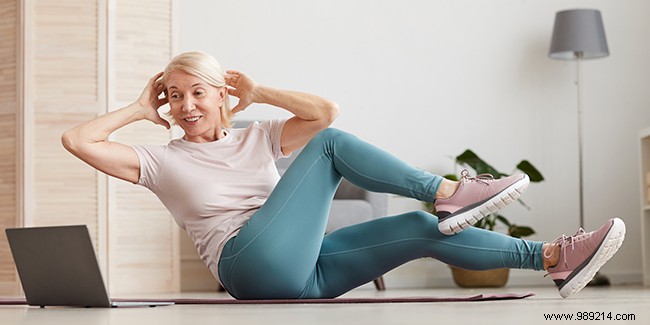
Many retired people enjoy walking to run errands and get some exercise at the same time. Other seniors indulge in more physical activities such as Nordic walking, but either because of confinement or because of weather that is not conducive to going outside, they rely on doing their house or apartment their playground! But what sport to practice at home, how and for what benefits?
Whatever the age, the practice of a physical activity is beneficial for the cardiovascular system, it makes it possible to maintain the "machinery":moreover, confinement has shown that elderly people who have been placed in wheelchairs for this period when the staff had a lot to do, saw their mobility regress after leaving confinement when their loved ones were able to see them again and make them walk again. Without going to these extreme cases, sport, as we know, is beneficial for improving the functioning of the joints, reducing the risk of osteoporosis, avoiding constipation, calming anxiety, promoting sleep, preventing overweight, strengthen immunity, prevent the onset of diabetes or even the declaration of certain cancers, regain a good mood and even prevent Alzheimer's disease.
The development of online courses makes it easier for all the chilly and all seniors who wish to do sport even in winter at home, without travel constraints.
Especially if you live alone, it is better to opt for an online group lesson, it will create a routine for you with external contacts, because all these sessions always give rise to a few chats before and after the session:this social link also has its function. in the practice of an activity.
In addition, doing a "virtual" sports session, i.e. via zoom for example, but live, reassures because the teacher will keep an eye on you so that they can encourage or correct you if a movement or posture is wrong, at the risk of hurting you.
Do not turn to a sport whose benefits have been praised to you if you have negative preconceptions about it. One of the major assets for your attendance to be flawless remains motivation in addition to pleasure; you must want to practice regularly, daily or weekly, as the case may be.
If you haven't played sports in years, don't engage in frantic activities that will cause your heart to pound beyond reason and perhaps lead to annoying dyspnea. Go gradually, without cutting corners, keeping in mind the objectives you have defined, without hurting yourself physically. Controlling your breathing is one of the "tricks" to properly manage the intensity of your activity. Don't overestimate yourself, especially at the beginning, you could quickly get discouraged:opt for lessons corresponding to your level or activities specially designed for seniors.
You are no longer 20, you are well aware of this, but there is no age limit for indulging in sport provided you choose it well... Turn to "slow-sport", soft sports, which combine physical activity and well-being:they are based on techniques relating to yoga, Pilates, stretching, qi gong, tai chi and physiotherapy movements. But, of course, you can opt for only one of these disciplines which tend to control breathing, balance and the mind, while working your muscles. Many people of all ages practice these activities whose anxiolytic effects are interesting when the news remains tinged, in addition, with a shades of gray.